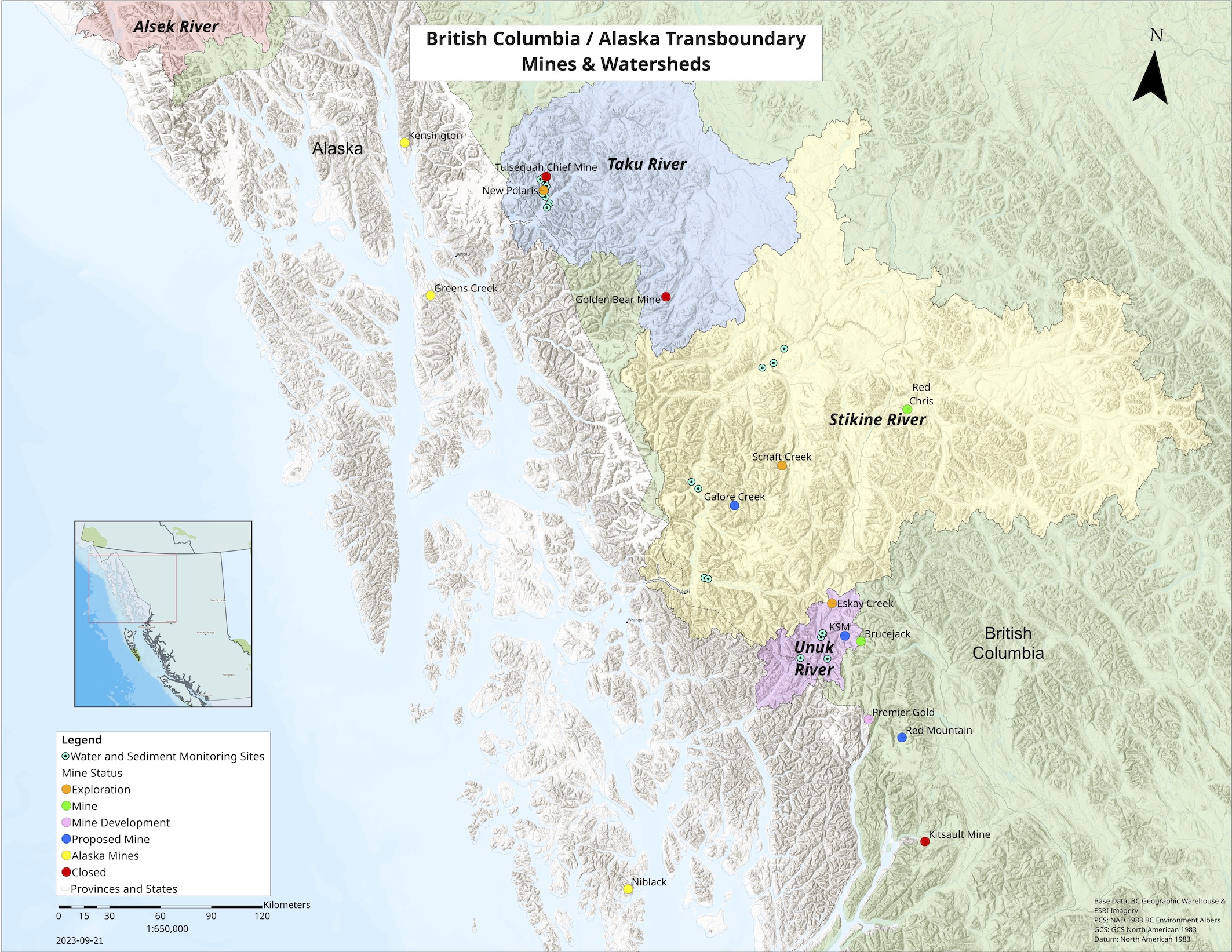Protecting the environment near the B.C. and Alaska border
B.C. and Alaska are working together to protect and enhance the environment we share.
Senior officials meet formally twice a year to discuss key environmental topics and are supported by staff who meet monthly to make progress on joint actions.
On this page
B.C. and Alaska working together
The bilateral working group was setup to build relationships and address key environmental topics related to our shared border and waterways. It includes senior officials from B.C. and Alaska:
- Commissioner from the Alaska Department of Environmental Conservation
- Commissioner from the Alaska Department of Fish and Game
- Commissioner from the Alaska Department of Natural Resources
- Deputy minister from the B.C. Ministry of Energy, Mines and Low Carbon Innovation
- Deputy minister from the B.C. Ministry of Environment and Climate Change Strategy
- Associate deputy minister from the B.C. Environmental Assessment Office
Read the formal agreement documents:
- Memorandum of Understanding (PDF, 255KB)
- Statement of Cooperation (PDF, 644KB)
- Reciprocal Procedures (PDF, 173.1KB)
- Communication Plan (PDF, 194KB)
The bilateral working group meets at least twice each year to:
- Share and discuss water quality data
- Share data or reports about mine operations, discharges and closures
- Provide updates on environmental assessments
- Provide updates on mine and land development permits
Read the meeting summaries
Meeting summaries
- June 2024 (PDF, 179KB)
- January 2024 (PDF, 268KB)
- June 2023 (PDF, 244KB)
- January 2023 (PDF, 230KB)
- February 2021 (PDF, 253 KB)
- September 2020 (PDF, 171KB)
- January 2020 (PDF, 91KB)
- June 2019 (PDF, 176KB)
- August 2018 (PDF, 131KB)
- May 2018 (PDF, 115KB)
- October 2017 (PDF, 287KB)
- April 2017 (PDF, 63KB)
- January 2017 (PDF, 21.6KB)
The bilateral working group provides direction for environmental protection activities
To date, the group has focused on water quality and mining activities near the international border.
Staff members from both governments meet monthly to work together to implement direction received from the bilateral working group.
Read updates about activities in the newsletter
Newsletter updates
- Transboundary Waters Newsletter 2024-2025 (PDF, 4.3MB)
- Transboundary Waters Newsletter 2023 (PDF, 4MB)
- Transboundary Waters Newsletter 2022 (PDF, 2MB)
- Transboundary Waters Newsletter 2020 (PDF, 1.2MB)
- Transboundary Waters Newsletter 2019 (PDF, 3.7MB)
- Transboundary Waters Newsletter 2018 (PDF, 3MB)
- Transboundary Waters Newsletter 2017 (PDF, 1.1MB)
Transboundary open house - June 2024
A transboundary open house was held in Juneau, Alaska on June 25, 2024. View the information posters and handouts that were shared.
- Mining Regulatory Improvements Since Mt Polley (PDF, 68.7KB)
- Reclamation Security (PDF, 101KB)
- Tailings Storage Facility (TSF) Revisions of the Health, Safety and Reclamation Code for Mines in B.C. (PDF, 299KB)
- EAO Environmental Assessment Process (PDF, 63.1 KB)
- Environmental Assessments in BC (EAO Fact Sheet) (PDF, 165KB)
- Transboundary Region Projects (PDF, 9.89MB)
- Coordinated Compliance & Enforcement Process (PDF, 6.49MB)
- Regulatory Framework for Mining (PDF, 44.7KB)
- Protecting our Shared Waters (PDF, 803KB)
- Teck - Work Proposed to Start in 2024 Field Season and Carry Through 2025 (PDF, 23.6KB)
- Teck - Workplan Presentation (PDF, 2.16MB)
- State of Alaska - Department of Natural Resources on Large Mine Bonding and Financial Assurance (PDF, 947KB)
Protecting watersheds along the B.C. and Alaska border
 Both governments are committed to protecting 4 major watersheds in northwestern B.C.:
Both governments are committed to protecting 4 major watersheds in northwestern B.C.:
- Alsek River
- Taku River
- Stikine River
- Unuk River
A technical team completed a 2-year program to gather water quality data in these watersheds. They analyzed:
- Water and sediment samples for general chemistry and metals
- Tissue samples in fish and small aquatic organisms for metals
The program was developed collaboratively with provincial, state, Indigenous and Tribal organizations. Read the program description and two-year work plan (PDF).
Technical committees hosted workshops and meetings to discuss environmental protection issues and concerns. The workshops included government agencies, Indigenous communities, the scientific community, mine industry representatives, environmental organizations and the public.
From the data collected, the technical team reported that, generally, water quality met Alaska's water quality standards. There were a few cases where water quality standards were not met:
- These cases were caused by high levels of naturally occurring minerals in the surrounding area, and not by human activity
- The measured levels were not a risk to local ecosystems
Read the reports:
Environmental protection and management practices in B.C.
Environmental assessments
Environmental assessments are completed for major natural resource and infrastructure projects.
The process includes engagement with B.C. First Nations, government experts from B.C. and Canada, local governments in the region, the public and nearby communities. Where projects have a potential for impacts that cross the border, B.C. also engages with Alaska Tribes, the State of Alaska and US federal government agencies.
Engagement and public participation are integral parts of the environmental assessment process. All comments received inform the environmental assessment decisions.
The Province regulates discharges from mining (mine impacted water, air emissions and solid waste) that enter the environment.
All major mine applications go through a thorough environmental and technical review, consultation and engagement process. A major mine typically requires permits under:
A robust permitting process and reclamation requirements are in place to make sure that mining projects near the B.C. and Alaska border are planned, operated and closed safely.
- Overview of B.C.’s Regulatory Framework Governing Mining (PDF, 723KB)
- Regulating mining in B.C.
- Indigenous engagement for mining projects
The following is a list of mining projects that are regularly reported on to the working group.
Eskay Creek
Galore Creek
Golden Bear
New Polaris
Premier
Red Mountain Underground Gold
Tulsequah Chief
Search all major B.C. mining projects: British Columbia Mine Information.
Contact us
If you have questions about environmental protection near the B.C.-Alaska border, email: EMLIcommunications@gov.bc.ca
Subscribe
Enter your email address to subscribe to updates of this page.
